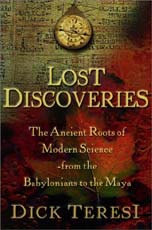|
Review by Richard Sumrall
According to Western tradition, the
history of science and mathematics is one of the grand triumphs of
what is referred to as the Golden Age of Greece. From approximately
600 B.C. until about 140 A.D. science flourished under the Greeks
and the Romans. After that time scientific progress lay dormant
until its "rediscovery" during the Renaissance era of 14th-century
Europe. This renewed interest in the physical and natural sciences
was the impetus for some the monumental scientific discoveries
credited to Europeans -- discoveries such as Copernicus' circular
planetary theory, Newton's laws of physics and Gutenberg's movable
type printing press. The existing body of scientific knowledge was
greatly expanded by the Europeans and represents the foundation of
modern science. That is the present-day explanation of the history
of science.
But is it really true? Is this notion
of European dominance the complete and accurate history of science
in the civilized world? Not exactly, according to author Dick Teresi.
In his new book, "Lost Discoveries," Teresi presents the argument
that many of the advancements of Western science and mathematics
were inspired by or borrowed from the world's non-European cultures.
Important discoveries traditionally attributed to Western scientists
and scholars were actually known to other cultures centuries
earlier. These discoveries and contributions came from cultures
around the world, including the Middle East, China, India, Africa,
Oceania and the New World (North, Central and South America).
Teresi's exhaustive research of the
historical record confirms that, far from being stagnant,
unsophisticated societies, these cultures developed an astonishingly
diverse body of knowledge about the natural world. In many cases
this knowledge predates the European application of the same
scientific principles.

Teresi surveys seven scientific
disciplines -- mathematics, astronomy, cosmology, physics, geology,
chemistry and technology -- and describes how different societies
were successful in advancing their culture by cultivating science
and mathematics.
A perfect example involves the Polish
astronomer Nicolaus Copernicus. His publication "Concerning the
Revolution of the Heavenly Spheres" is generally regarded as "the
most important scientific achievement in Western history." Science
historian Thomas Kuhn writes that the "Copernican Revolution …
represented a final break with the Middle Ages, a movement from
religion to science." The Copernican theory held that the sun,
rather than the earth, was at the center of the solar system and
that the planets revolved around the sun.
Teresi finds in the historic record
that this scientific fact was known to other cultures centuries
before Copernicus. For example, astronomers in ancient India knew
prior to Copernicus that the earth revolved around the sun; they
made this discovery without the use of telescopes through "naked-eye
astronomy."
[to top of second column in
this review] |

Teresi's book has numerous examples of
advancements in science credited to the West but previously known to
non-Western cultures. Some notable examples include:
Mathematics
The Babylonians developed the
Pythagorean theorem at least 1,500 years before Pythagoras was born.
India invented our present-day numerals "0" through "9" and also
used geometry and trigonometry. The scribes of Egypt recognized pi
(3.14) before the Greeks.
Astronomy
Five thousand years ago the Sumarians
knew that the earth was circular. The ancient Arabs built the first
observatories and gave the present-day names to stars and
constellations. Between 1,400 B.C. and 1,200 B.C. the Chinese
observed, reported, dated and interpreted eclipses.
Physics
Twenty-four centuries before Newton,
Hindu Rig-Veda postulated that gravity held the universe together.
Islamic scholar Alhazen developed theories on light, rays and
refraction that were the precursor to modern optics. Two thousand
years before Newton, Mohist (Chinese) physicists recorded their
version of the laws of motion.
Geology
Smelting equipment for metalworking
from 4,000 B.C. has been discovered in present-day Iran. Arab and
Chinese scholars were the first to use fossils to trace the earth's
history.
Chemistry
Early African scientists and physicians
discovered plants that contained medicinal qualities, dyes and
dyestuffs. Prior to the Spanish invasion of the Americas, the Aztecs
used native plant resins and saps for turpentine, balsams,
medications and perfumes.
Technology
According to Francis Bacon the three
inventions that heralded the beginning of the modern Western world
were gunpowder, the magnetic compass, and papermaking and printing.
All three were invented in ancient China. The Andean farmers of Peru
were the first to freeze-dry potatoes, while their Quechuan Indian
counterparts discovered how to vulcanize rubber.
Recognized
by Library Journal as one of the best science books of the year,
"Lost Discoveries" is an authoritative study of the history of
science and the achievements of non-European cultures. Its
comprehensive footnotes, bibliography and index further enhance the
book's value. Teresi's attention to detail and historical accuracy
has produced a work that takes its place as an important
contribution to the literature of science history. This book is
highly recommended to everyone who enjoys history or science or
simply would like to increase their knowledge about the advances and
accomplishments of non-Western cultures.

[Richard Sumrall,
Lincoln
Public Library District] |